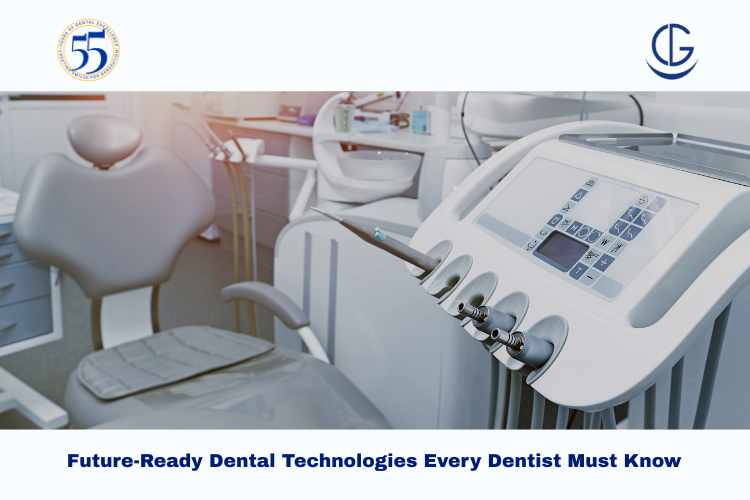Schedule Appointment



In 2025, the dental industry is undergoing a revolution, and the top dental technologies every dentist should know are at the heart of this transformation. At Dr. Gowds Dental Hospitals, we are committed to adopting cutting-edge tools that enhance patient care, accuracy, and comfort. This AI-powered guide highlights the most impactful innovations shaping the future of dentistry. Whether you’re a dental professional or an informed patient, understanding the top dental technologies every dentist should know will help you stay ahead and ensure the highest standard of oral care.
Dentistry has come a long way from manual tools and slow procedures. Today’s innovations are improving diagnosis, treatment, and follow-ups like never before. These top dental technologies every dentist should know are not just fancy add-ons—they’re essential tools that redefine precision, speed, and patient satisfaction.
AI systems like Pearl and VideaHealth can analyze radiographs and intraoral scans faster and more accurately than the human eye, helping dentists make better decisions.
At Dr. Gowds Dental Hospitals, we use AI to spot issues early and create more effective treatment plans.
Teledentistry has become one of the top dental technologies every dentist should know post-pandemic. It allows dentists to consult with patients remotely for non-emergency evaluations and follow-ups.
However, severe issues should always be evaluated in-person by a dental professional.
From dentures to crowns and orthodontic devices, 3D printing allows for custom solutions that are quicker and more precise.
We use 3D printing at Dr. Gowds Dental Hospitals to craft restorations that perfectly match each patient’s anatomy.
Intraoral scanners are replacing messy physical molds, making them one of the top dental technologies every dentist should know in 2025.
Digital impressions also enhance accuracy in the lab, reducing remakes and delays.
Laser dentistry is used for soft tissue surgeries, cavity treatment, and even teeth whitening. It’s minimally invasive and highly precise.
Our laser-equipped clinics make procedures smoother for patients of all ages.
Augmented reality helps dental professionals visualize complex procedures and anatomy in real-time, making it one of the top dental technologies every dentist should know for both learning and patient communication.
Smart toothbrushes now feature AI that helps users maintain better brushing habits and detect early signs of dental problems.
This is a great tool dentists can recommend to patients for improved at-home care.
Though still emerging, robotic technology assists with precision tasks such as dental implant placement, especially in complex cases.
We’re closely following this exciting trend at Dr. Gowds Dental Hospitals.
New bioactive dental materials are now used to promote healing and tissue regeneration in procedures like fillings and bone grafts.
These advancements allow dentists to treat more conservatively while supporting the body’s natural processes.
Cloud-based platforms like Dentrix Ascend streamline patient management, appointment scheduling, and record keeping.
These tools are crucial in managing high-quality care and operations, making them a part of the top dental technologies every dentist should know.
Although technology enhances care, it’s not a substitute for expertise. If you experience symptoms like persistent pain, swelling, or bleeding gums, always consult a licensed dental professional. Self-diagnosing through apps or online tools can delay critical treatment.
At Dr. Gowds Dental Hospitals, our experts combine technology with years of experience to ensure accurate diagnoses and effective treatments.
The top dental technologies every dentist should know in 2025 are reshaping how we diagnose, treat, and prevent dental conditions. From AI and 3D printing to laser treatment and cloud-based systems, these innovations are setting new standards in patient care. At Dr. Gowds Dental Hospitals, we embrace these advancements to provide modern, efficient, and pain-free dental experiences.
Stay updated, invest in your oral health, and consult professionals when in doubt. Let technology work for your smile—but always under the guidance of skilled hands.
In 2025, the most advanced dental technologies include AI diagnostics, 3D printing for dental restorations, laser treatments, and robotic-assisted surgeries. These innovations improve accuracy, reduce discomfort, and enhance treatment outcomes.
Modern dental technologies help dentists diagnose problems earlier, perform procedures with more precision, and reduce recovery time. Tools like intraoral scanners, laser equipment, and smart dental software make dental visits faster, safer, and more comfortable.
Yes, most dental technologies are safe for patients of all ages, including children and the elderly. For example, laser dentistry offers a painless option for treating gum disease, and 3D-printed aligners are ideal for teens and adults alike.
While dental technologies enhance many procedures, they don’t fully replace traditional tools. Instead, they complement them—improving efficiency and precision in treatments like cavity fillings, orthodontics, and dental surgeries.
Clinics like Dr. Gowds Dental Hospitals in India are leading the way in adopting the latest dental technologies. From AI-based diagnostics to 3D-printed crowns, they offer state-of-the-art care tailored to each patient’s needs.